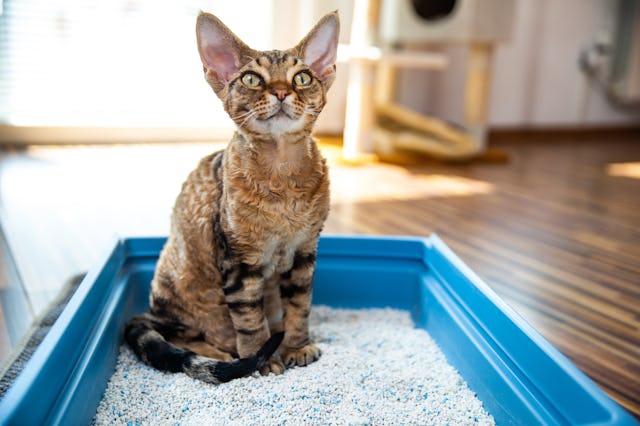Can You Flush Cat Litter Down The Toilet, Or Is That A Terrible Idea?
A veterinarian and a plumber weigh in, and both have a strong stance.

As a cat mom, I can definitively say there are many pros to owning a cat — like snuggles, someone to talk to who doesn't talk back, being in awe of so much furry cuteness, and did I mention snuggles? Probably the biggest con, however, is the cat litter business. Scooping it, disposing of it... the whole thing is basically the bane of cat ownership. And let's be honest; the cats are a little smug about it. While it's a necessary evil, I've considered making it a little easier on myself (and my ego) by considering flushable cat litter.
Why not subtract all the fuss and muss and just flush that stuff down the toilet like humans do? What's really so bad about it? Well, it turns out a lot. Much like wipes for humans marketed as flushable aren't actually suitable for plumbing and septic systems, "flushable" cat litter can lead to much bigger issues than having to scoop some poop.
So, this is for all my fellow cat owners wondering, Can you flush cat litter? Keep reading for all the gritty, sh*tty details.
Why You Can't Flush Cat Poop
The most important reason you can't flush cat litter isn't so much the litter (although we'll get to that later) but your cat's poop.
"Cat feces can contain a parasite called toxoplasma," Dr. Paula Simon, DVM, tells Scary Mommy. "This can cause serious health issues in immunocompromised or pregnant women. Placing cat feces in the toilet can contaminate the toilet or bathroom, leading to infections in exposed people."
Cats contract this parasite by eating infected rodents or meat containing parasitic cysts, and if you think indoor cats are free of the risk, think again. According to Simon, because mice and rats love coming indoors, they can still transmit the parasite. The scary thing about toxoplasma is that many infected cats show no signs of disease, and many healthy humans will also be symptom-free.
"Immunocompromised humans may develop enlarged lymph nodes, ocular/neurological problems, respiratory disease, and heart disease," Simon says. "Infected mothers will generally not show clinical signs, but their babies may have developmental conditions or mothers may experience abortion."
And flushing your cat's poop means toxoplasma can also enter the environment through waterways once it hits the sewage system, which can affect marine wildlife — potentially killing them.
Why You Can't Flush Cat Litter
It's not only the poop you can't flush; you shouldn't flush cat litter down the toilet, either.
"I've been in the plumbing industry for more than 15 years, and I can tell you from firsthand experience that you should never flush cat litter down your toilet," Anthony Cafagna, founder and CEO of All City Plumbing, tells Scary Mommy. "As cat owners probably know, cat feces becomes very solid when it dries, so dumping your cat's litter box into the toilet and then flushing it can decimate your plumbing system and clog the pipes."
Cafagna says clay-based litters (the cheapest and most commonly used) can expand up to 15 times their original size once exposed to water, creating a severe clog in your waste pipes over time. "And while there are plenty of flushable litters that claim to be safe for your toilet, the volume of waste that goes down the toilet from emptying a tray is significantly more than your toilet and connecting pipes are designed to handle, especially if you have a water-saving toilet," he says.
"Lastly, septic tanks and water treatment systems aren't designed for cat litter, whether it's clay-based or bio-degradable/ flushable litter. Septic tanks and cat litter don't get along because septic tanks aren't equipped to break down materials like cat fecal matter and litter. Dumping your cat litter tray down the toilet will only clog up the tank and create an expensive problem for yourself down the line."
How to Dispose of Cat Litter Properly
What's the right way to dispose of cat poop and pee? According to Simon, cat litter should be disposed of in a special garbage container or placed directly in a dumpster. She recommends not putting emptied litter in the household garbage, which can lead to foul odors and spreading bacteria/parasites.
Additionally, she advises to "always wash hands after handling cat litter" and clean the cat litter daily, "not only to reduce odor but also to ensure healthy litter box habits by cats. Cats truly dislike dirty litter boxes, so cleaning infrequently can cause them to develop inappropriate urinary habits like urinating outside the litter box."
And you know they'd do that with a smirk, so you might as well act like the rest of us losers and empty it daily — not in the toilet.
This article was originally published on